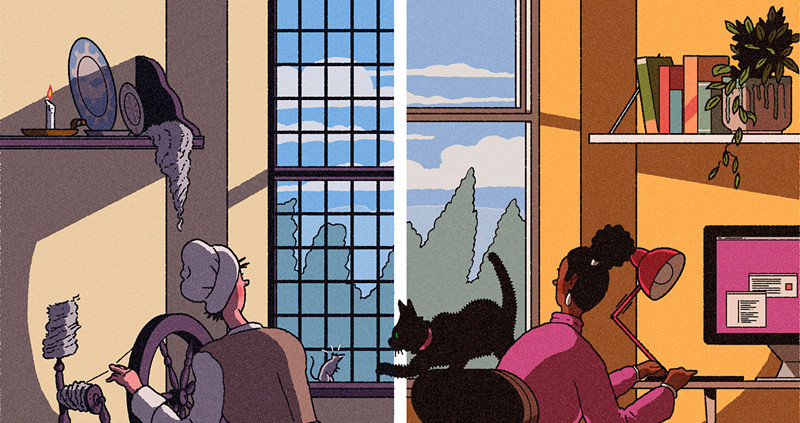(单词翻译:单击)
The shift from offices to kitchen tables among white-collar workers in 2020 seems unprecedented, and only possible with Slack and Zoom. But it is nothing new. Indeed, the history of home-working suggests some surprising parallels with today.
2020年,白领从办公室到餐桌的工作模式转变似乎是前所未有的,且多亏了Slack和Zoom这两个软件才得以实现。但这并不是什么新鲜事。事实上,在家工作的历史与今天有一些惊人的相似之处。
The emergence of capitalism in Britain and elsewhere from the 1600s to the mid-19th century did not take place primarily in factories, but in people's houses. Workers made everything from dresses to shoes to matchboxes in their kitchens or bedrooms. When Adam Smith wrote "The Wealth of Nations" in 1776, it was perfectly common to work from home. Smith famously described the operation of the division of labour in pin-making, but not in a dark, satanic mill. He was describing a "small manufactory" of perhaps ten people—which could well have been in or attached to somebody's house.
从17世纪到19世纪中叶,资本主义在英国和其他地方的产生主要不是在工厂里,而是人们的家里。工人们在他们的厨房或卧室里制作各种东西,从衣服到鞋子、火柴盒。亚当·斯密在1776年写下《国富论》时,在家工作是非常普遍的。他对于针制造中的劳动分工描述尤为著名,但不是在黑暗、邪恶的作坊中。根据他的描述,是大约有十个人的“小工厂”——它很可能在某人的房子里,或者是某人房子的一部分。
It is not easy to put exact numbers on how many people have worked from home during different historical periods. Even in Britain, where economic data reach farther back than in any other country, little reliable labour-force data exist until the mid-1800s. Other sources left clues, however. One relates to the meaning of the word "house". Today it connotes domesticity. But up until the 19th century it had a much broader definition, with the suffix "-house" encompassing economic production, too. In "A Christmas Carol", Scrooge works in a "counting-house". Architecture offers other hints. In Britain, many 18th-century houses still have unusually large upstairs windows; cloth-weavers, who worked there, needed as much light as they could get.
在不同的历史时期,很难准确统计有多少人在家工作。即使在英国,经济数据比其他任何国家都要久远,到19世纪中叶,可靠的劳动力数据还很少。然而,其他资源留下了线索。其中一个与“房子”一词的含义有关。今天它意味着家庭生活。但在19世纪,它有了更广泛的定义, “XX房子”也包括经济生产活动。在《圣诞颂歌》中,斯克鲁奇在一个“帐房”工作。建筑给了我们其他提示。在英国,许多18世纪的房子上层窗户依然非常大;在那里工作的织布工需要尽可能多的光线。

The emergence of an at-home industrial workforce had two main causes. The growth of global trade and the rise in per-person income from the 1600s onwards raised demand for manufactured goods such as woollens and watches.
在家工作这种工业劳动力的出现有两个主要原因。自17世纪以来,全球贸易增长和人均收入增加提高了对羊毛和手表等制成品的需求
Home-workers may have been poorly paid relative to factory folk, but they could earn income by other means. That was not the only advantage. Home-workers in rural or semi-rural areas could forage for fuel and food, and so boost their meagre incomes. Home-workers also had more control over their time. So long as the work was done to the required standard and on time, they were not told exactly when or how to do it. That was in sharp contrast to the factory, where every aspect of life was planned in advance and workers were closely monitored. And home-workers could decide on the exact mix between work and leisure—in contrast to factory workers, who either worked the 12- or 14-hour days stipulated by the factory owner or none at all. People also got more sleep. This greater autonomy was especially important for mothers. In a world where men did little by way of family work, women could combine child care with contributing to the family income. It was far from easy. Sometimes women would give their infants "Godfrey's Cordial", a mixture of sugar syrup and laudanum, to knock them out for a while. But home-working allowed for the combination of paid work and family work in a way that the factory system did not. As factories spread, female labour-force participation fell.
相对于工厂工人来说,在家工作的人可能收入较低,但他们可以通过其他方式赚取收入。这不是唯一的有点。生活在农村或郊区的工人可以寻找燃料和食物,从而增加他们微薄的收入。在家工作的人也能更好地控制自己的时间。只要工作按照要求的标准按时完成就行,不会对工作完成的时间和方式做出要求。这与工厂形成了鲜明的对比,在工厂里,生活的每个方面都是计划好的,工人们受到密切监视。在家工作的人灵活结合休闲和工作——与工厂工人相反,工厂工人要么按照工厂老板的规定每天工作12或14小时,要么根本不工作。在家工作的工人们也得到更多的睡眠。这种更大的自主权对母亲来说尤其重要。在一个男人几乎不做家务的世界里,女人可以兼顾照顾孩子和赚钱。这一点也不容易。有时候,女人会给她们的婴儿喝“戈弗雷甜酒”,这是一种糖浆和鸦片酊的混合物,让他们昏迷一段时间。但是在家工作允许工作和家庭相结合,这是工厂体系所不允许的。随着工厂的扩张,女性劳动率下降。
In 1920 Max Weber, a German sociologist, argued that the separation of the worker's place of work from their home had "extraordinarily far-reaching" consequences. The factory was more efficient than the home-based system which had preceded it—but it was also a space in which workers had less control over their lives, and where they had much less fun. Today's pandemic-induced shift back to the home could have similarly far-reaching effects.
1920年,德国社会学家马克斯·韦伯(Max Weber)认为,工人的工作场所与他们的家分开会产生“极其深远”的后果。与之前在家工作相比,在工厂工作更高效——但它也是一个工人对自己的生活控制力更弱、乐趣更少的地方。取决于它被证明有多持久,今年由疫情引发的回家工作潮可能会有同样深远的影响。


